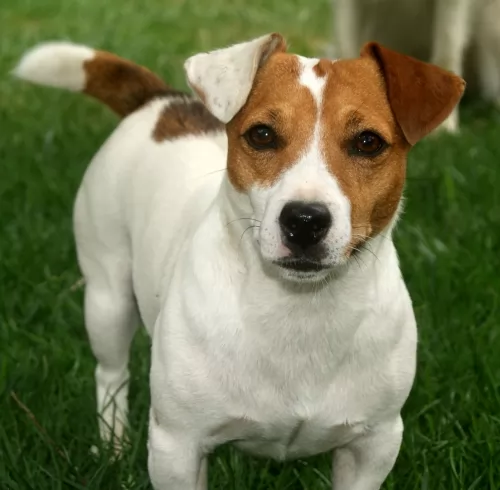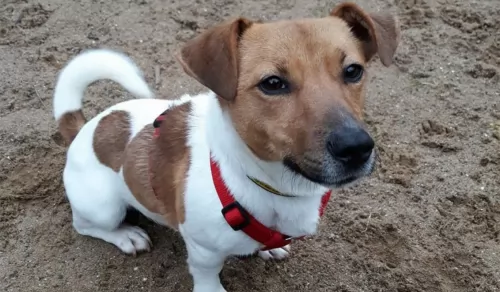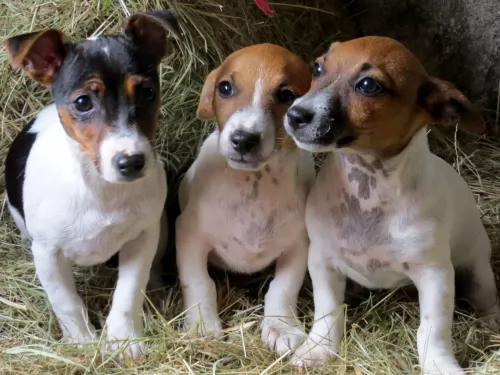 Petzlover
Petzlover Irish Jack Russell is originated from United States but Spanish Mastiff is originated from Spain. Irish Jack Russell may grow 53 cm / 20 inches shorter than Spanish Mastiff. Irish Jack Russell may weigh 92 kg / 202 pounds lesser than Spanish Mastiff. Irish Jack Russell may live 4 years more than Spanish Mastiff. Both Irish Jack Russell and Spanish Mastiff has almost same litter size. Both Irish Jack Russell and Spanish Mastiff requires Low Maintenance.
Irish Jack Russell is originated from United States but Spanish Mastiff is originated from Spain. Irish Jack Russell may grow 53 cm / 20 inches shorter than Spanish Mastiff. Irish Jack Russell may weigh 92 kg / 202 pounds lesser than Spanish Mastiff. Irish Jack Russell may live 4 years more than Spanish Mastiff. Both Irish Jack Russell and Spanish Mastiff has almost same litter size. Both Irish Jack Russell and Spanish Mastiff requires Low Maintenance.
 Originating in the United States of America, the Irish Jack Russell, also known as Short Jack Russells, was bred to bring about a calmer temperament and to also have a dog with shorter legs.
Originating in the United States of America, the Irish Jack Russell, also known as Short Jack Russells, was bred to bring about a calmer temperament and to also have a dog with shorter legs.
Always a working dog, breeders of the Irish Jack Russell wanted to create a dog with less of a hunting instinct in him and have a dog which would be more companionable.
These Irish Jack Russells look much like your regular Jack Russell but are more of a companion dog than a hunting dog. The Irish Jack Russell doesn’t adhere to any existing Jack Russell breed standard and isn't really recognized at major dog clubs and kennels. The truth of the whole matter is that there are different kinds of Jack Russells and different names given to them to differentiate between the taller Jack Russell and the short legged one. The shorter Jack Russell Terriers are known by many names such as Irish Jack Russell and Shorty Jack Russells.
 The Spanish Mastiff is a giant breed that comes from Spain. He has always been a guardian dog.
The Spanish Mastiff is a giant breed that comes from Spain. He has always been a guardian dog.
He is an ancient dog breed, in fact dating back to medieval times. He has always been a guardian of livestock, protecting them from attacks from wolves and other predators.
The first breed standard of this pure breed dog was made by the FCI in 1946. A breeding program was also formed for this dog In 1981.
 Irish Jack Russells are small dogs standing at roughly 18 to 35cm and weighing in the region of 5 to 8kg for both males and females.
Irish Jack Russells are small dogs standing at roughly 18 to 35cm and weighing in the region of 5 to 8kg for both males and females.
He looks much like your regular Jack Russell but he has shorter legs, and where the regular Jack Russell has an essentially white coat with orange-tan patches, the Irish Jack Russell can be solid tan or other color variations such as red, brindle, black and tan.
The coat can be short or fairly long and coarse. The Irish Jack Russell is a sturdy, compact dog with a flat skull, brown eyes and ears which are semi-erect, semi-floppy. He has a bright, alert, intelligent look on his face. The tail is set fairly high and has always been docked but these days it is inclined to be left long, taking away from the dog’s nice compact look.
The Irish Jack Russell is perhaps more placid than the regular Jack Russell and that is why he can adapt to life in the city or in the country. They’re intelligent dogs and therefore easy to train and have socialized.
Even though he is a small dog, training and socialization is important as he is a feisty, stubborn, know-it-all little dog. These are dogs which can become possessive of their owner and they can become quite aggressive when protecting their family. He is a highly trainable dog but it is important to have him trained as he tends to be aggressive with other dogs.
He is busy, active, happy and inquisitive and will require regular exercise to prevent him becoming restless and destructive. He has been a working terrier and he always wants to be busy.
 The Spanish Mastiff weighs between 52 and 100kg and the dog’s height is between 72 and 88cm. He has a thick, heavy coat with rustic colors of fawn, black, grey, reddish and yellow as well as brindle.
The Spanish Mastiff weighs between 52 and 100kg and the dog’s height is between 72 and 88cm. He has a thick, heavy coat with rustic colors of fawn, black, grey, reddish and yellow as well as brindle.
He is powerful and muscular with a huge head. The ears are medium length and floppy and the tail is long. If you were looking for a puppy, the American Kennel Club is the only site which has 100% puppies from AKC-Registered litters.
Large, kind, gentle and intelligent, the Spanish Mastiff is well balanced. When you see him you won’t find a dog that is light on his feet and who jumps around excitedly. He is a dignified, intelligent dog, quiet and calm.
Even though he is so calm, it is still a good idea to have him trained and socialized as his very size could be a problem. When you tell him to lie down, you want him to listen to you. This big, gentle giant is devoted to his human family ad takes the role of guardian and protector seriously.
He isn’t suited to life in the city but is better suited to a large property, also because he has a loud bark.
 The Irish Jack Russell is a self-confident, energetic dog who will like nothing more than to be involved with everything you’re doing. The busier he is the better, and because he has strong hunting instincts you may find him digging in your garden for rats.
The Irish Jack Russell is a self-confident, energetic dog who will like nothing more than to be involved with everything you’re doing. The busier he is the better, and because he has strong hunting instincts you may find him digging in your garden for rats.
Have him trained and socialized if you want to avoid certain problems with him and remember to exercise him and provide him with the attention he craves.
He is a social dog and will pine away if you just leave him to get by on his own. Make sure that he becomes every bit as part of your family as everyone else and he promises to make you a loyal, devoted companion.
 Kind, gentle, quietly confident and intelligent are just some of the wonderful characteristics of the Spanish Mastiff.
Kind, gentle, quietly confident and intelligent are just some of the wonderful characteristics of the Spanish Mastiff.
You can add loyalty and devotion to these characteristics too and the fact that he wants to protect you.
Your gentle giant is guaranteed to make you the most wonderful companion and he deserves the very best treatment there is.
 Your Irish Jack Russell is a dog that doesn’t battle with too many health issues, but nonetheless you still need to watch out for common health problems.
Your Irish Jack Russell is a dog that doesn’t battle with too many health issues, but nonetheless you still need to watch out for common health problems.
Jack Russell terriers are generally a healthy breed that can live up to 14 years of age, but still every dog is prone to the more common dog problems such as hip dysplasia, bloat, ear infections and dental disease among others.
If your Irish Jack Russell is in pain, he is lethargic and sick, don’t delay – take him to the vet right away.
 It is good to be wise about some of the common dog problems there are that could plague your Spanish Mastiff. Vets are very familiar with these dog illnesses and they tailor their treatment to suit the needs of your dog.
It is good to be wise about some of the common dog problems there are that could plague your Spanish Mastiff. Vets are very familiar with these dog illnesses and they tailor their treatment to suit the needs of your dog.
Remember to get your pet vaccinated against the terrible diseases you get that can kill a dog – rabies, parvo and distemper.
People often think that obesity is something that isn’t dangerous, when in fact it is a serious disease that can cause joint problems, digestive disorders, heart disease, back pain and hip dysplasia.
Dogs rely on water just like what humans do to keep them healthy and functioning properly.
Water is critically important to every organ and also assists with digestion. Your dog is panting and urinating throughout the day and needs to replace the liquid he loses.
Dehydration in dogs results in loss of electrolytes, such as sodium, chloride, and potassium.This is bad as these minerals have important functions.
A dog that is dehydrated has loss of appetite, loss of skin elasticity, is lethargic, has sunken eyes, wants to vomit, has a dry nose and thick saliva. No dog should ever be left without a constant supply of fresh, cool water day and night.
 The Irish Jack Russell is an average shedder with his short or longish coat which is easy to groom, requiring a brush once or twice a week. His nails grow quickly too and they can get caught on something and cause him damage. Trim your pet’s nails to prevent this.
The Irish Jack Russell is an average shedder with his short or longish coat which is easy to groom, requiring a brush once or twice a week. His nails grow quickly too and they can get caught on something and cause him damage. Trim your pet’s nails to prevent this.
Feed your Irish Jack Russell good quality dog food each day. If you feed him commercially manufactured dog food, be certain to check the feeding instructions on the packaging.
He is a small dog, and overfeeding can be just as bad as under-feeding. It’s never a good idea to just go on and on feeding your pet dry or wet kibble day after day. Add in some cooked chicken, rice, pasta and vegetables as a treat and to also provide some variety for him.
Also a little bit of raw meat occasionally can do him the world of good and you’ll see the appreciation in his bright eyes and wagging tail.
 These are giant breed dogs, so you have to be careful with the way you feed them. Large dogs like these are prone to hip dysplasia so you need to choose a food which has ingredients that work to prevent this disease.
These are giant breed dogs, so you have to be careful with the way you feed them. Large dogs like these are prone to hip dysplasia so you need to choose a food which has ingredients that work to prevent this disease.
You have to be very careful that you don’t overfeed your dog so that the extra weight puts strain on the joints.
This dog will do well with some raw meat added into his diet. Also, include home-made food too. Boiled chicken, brown rice or pasta, sweet potatoes, carrots and spinach chopped up and added to his dry kibble for giant breeds. Added in twice a week can do him the world of good.
A good bush of the thick coat twice a week will keep the Spanish Mastiff looking his best.
The nails will also need to be trimmed regularly to avoid overgrowth and to avoid the nails catching onto things. The ears too should be checked regularly to avoid dampness inside the ear which can cause bacteria.
As a fully grown adult, the Spanish Mastiff isn’t a frisky, frolicking dog but he will still require daily exercise. Options for exercise include long walks, hikes, swimming and ball games.